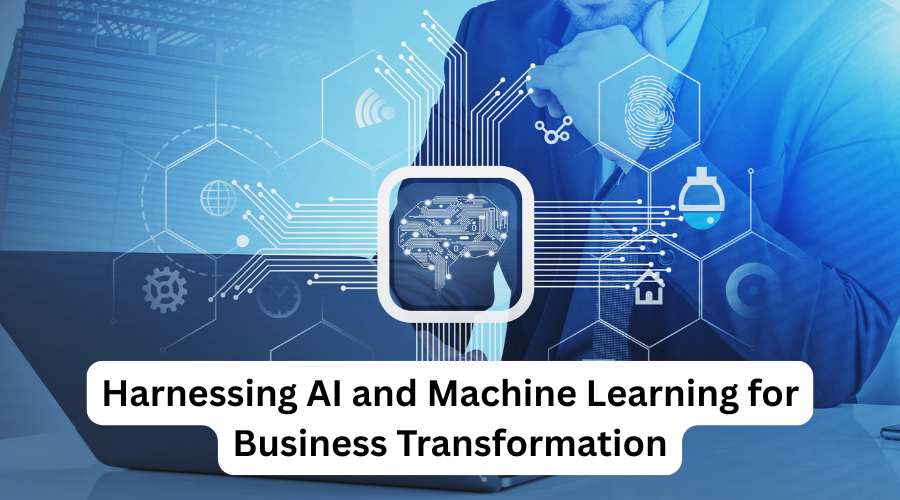- By anju pattanashetti
- July 22, 2025
- No Comments
Harnessing AI and Machine Learning for Business Transformation
Introduction
The global business landscape is undergoing a paradigm shift, driven by rapid advancements in Artificial Intelligence (AI) and Machine Learning (ML). These technologies are transforming traditional business models, enabling smarter operations, enhanced customer experiences, and data-driven decision-making.
Educational institutions, industries, and governments alike are recognizing the strategic importance of AI and ML in driving innovation and competitiveness. This blog explores how businesses can harness these technologies to unlock new levels of efficiency, agility, and value.
Harnessing AI and Machine Learning for Business Transformation
Artificial Intelligence refers to the development of computer systems capable of performing tasks that typically require human intelligence—such as visual perception, speech recognition, decision-making, and language translation.
Machine Learning, a subset of AI, enables systems to learn from data patterns and improve performance over time without being explicitly programmed.
Together, AI and ML provide powerful tools for analyzing data, predicting trends, and automating complex tasks.
Key Areas of Business Transformation
1. Automation of Business Processes
Routine and repetitive tasks like data entry, invoice processing, and report generation can be automated using AI-powered tools, reducing human error and increasing operational efficiency.
2. Predictive Analytics
ML models analyze historical and real-time data to forecast future trends—such as customer behavior, inventory needs, and market demands—allowing businesses to make proactive, informed decisions.
3. Customer Experience Enhancement
AI-driven chatbots and recommendation engines offer personalized support and services, improving engagement and building long-term customer relationships.
4. Data-Driven Decision Making
AI systems help managers analyze vast datasets quickly and accurately, enabling strategic decisions based on insights rather than intuition alone.
5. Product and Service Innovation
From AI-powered diagnostic tools in healthcare to self-driving technologies in automotive industries, businesses are using AI to develop smarter, more responsive solutions.
Real-World Applications
– Retail: Companies like Amazon use ML algorithms for inventory optimization and personalized recommendations.
– Entertainment: Netflix applies AI to suggest content based on user preferences, enhancing viewer satisfaction.
– Healthcare: AI assists in early diagnosis, treatment planning, and monitoring patient outcomes with precision.
– Banking: Financial institutions deploy ML models for fraud detection, risk assessment, and customer service automation.
Challenges in Implementation
While the potential is vast, organizations face several challenges when integrating AI and ML:
– Data Privacy and Security: Ensuring ethical data use and compliance with regulations is critical.
– Talent Shortage: There is a significant demand for AI professionals and data scientists.
– Cultural Resistance: Change management and employee training are vital for successful adoption.
– Initial Investment: Implementing AI solutions can require significant upfront costs and infrastructure changes.
Future Outlook
AI and ML are continuously evolving, with new algorithms, tools, and frameworks being developed. In the near future, we can expect even more personalized digital experiences, intelligent automation, and autonomous decision-making systems.
Businesses that strategically invest in AI technologies and nurture a culture of continuous innovation will lead the transformation across industries.
Conclusion
Artificial Intelligence and Machine Learning are redefining the rules of business success. They are not just enhancements but essential enablers of digital transformation. By embracing these technologies, organizations can drive operational excellence, foster innovation, and create lasting value in the digital age.
As academic institutions, it is our responsibility to educate future professionals and entrepreneurs to understand, apply, and lead the AI-driven revolution in business and beyond.



